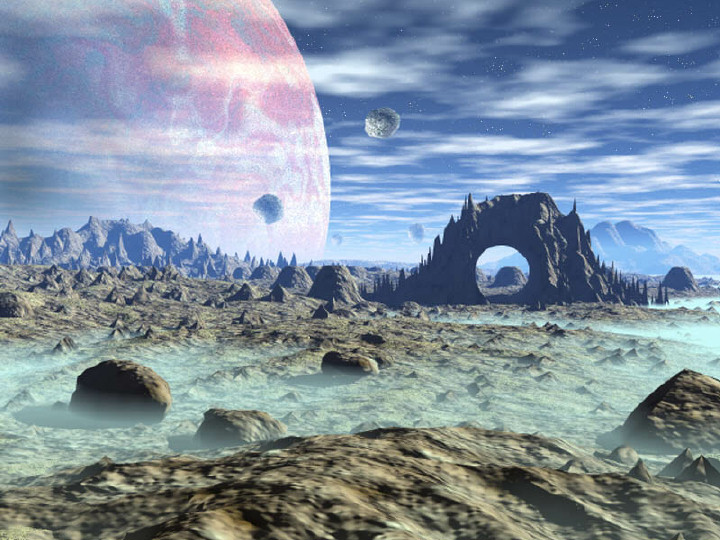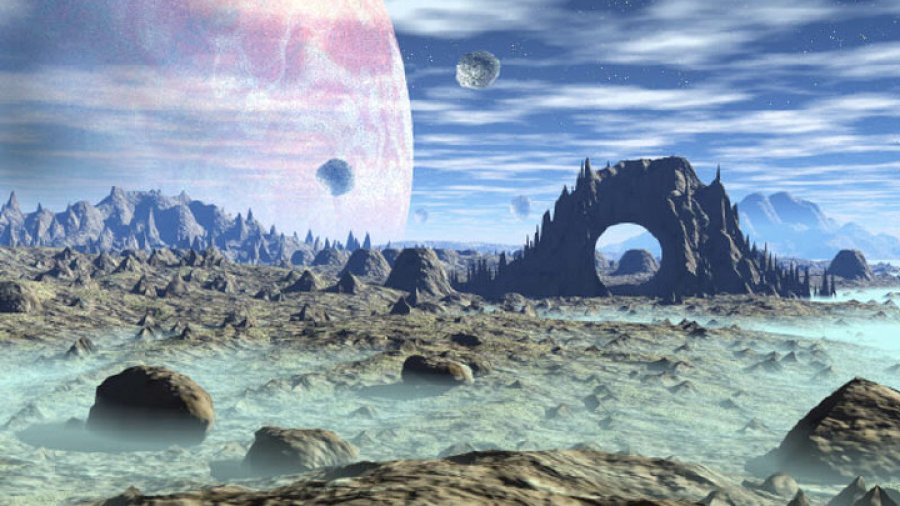“We live in a world where there is more and more information, and less and less meaning.”
Jean Baudrillard
I think an interesting and fruitful metaphor for the Internet is this: a man-made multiverse of information, intellect, and imagination. I say “multiverse” for no reason apart from it being more fun and mysterious and futuristic-sounding; “universe” could be inserted just the same.

By G.E. Mont. Photo Credit: Wiki Commons
Internet Multiverse
Internet: a space of incomprehensible vastness and possibility populated with objects ranging from diminutive subatomic particles (bits) to sprawling superclusters of galaxies (Google). Bits, kilobytes, megabytes, and gigabytes of data respectively comprise everything from quarks to atoms to molecules to elements to compounds. The proverbial quantum world, or ground of being, is composed of web servers, PCs, smartphones, and the related hardware and electronics that bring the whole shebang to life before our eyes. Without this hardwired ground of being, there’s no roadshow.
A website is, at the very least, a tiny planet with a population of one—its creator. You can imagine web-entities ranging from humble planets to colossal superclusters. Certain media giants—Gawker, Vice, HuffPo, New York Times, Buzzfeed, etc.—are, for better or worse, solar systems or galaxies. Top-of-the-top web-entities—Google, Facebook, Twitter, etc.—are clusters or superclusters of galaxies. You can imagine web-entities growing in size and power in proportion to the number of visitors/users they receive per week or month. Number of visitors/users, though not perfect, is a satisfactory starting point for considering Internet-power.
Internet-Power
Web-entities can be seen as existing on a spectrum of power—i.e. an entity’s ability to affect, change, and/or shape the collective consciousness of the Internet, directly (through its own content) or indirectly (by influencing the architecture of user content (interface design, software, upload guidelines, etc.) on itself and other planets, controlling major modes of transportation from one planet to another (search engines, link-sharing platforms), controlling major modes of communication between people (email, social networking, etc.).
You might notice that the latter sort of power—the indirect kind—is the sort harnessed by most of the largest entities in the multiverse. Google, YouTube, Twitter, Facebook, WordPress, Reddit, and other web-behemoths control the architecture, building codes, modes of transportation, and modes of communication for an enormous segment of the multiverse’s planets and people. They also have millions or billions of users who have created planets (profiles, accounts, channels, blogs) within them. Thus, they transcend mere planet or solar system status to become galaxies, clusters, and perhaps even superclusters of galaxies with inestimable reach and power. They’re like clusters of galaxies with ultra-advanced civilizations living in them.
Examples
As a more concrete example of Internet-power, consider the sorta-recent Facebook scandal in which it came to light that the company had intentionally manipulated the emotions of some 600,000 users. It didn’t do this directly, by creating a blog post or video or something like that, but indirectly, by mediating the content that appeared on users’ feeds so as to display more emotionally provocative items. This is one of the more egregious examples in recent memory of a web-giant flexing its muscles, but it happens more subtly all the time. Facebook’s algorithms constantly monitor your activity on the site and tailor your newsfeed accordingly, attempting to show you more of what interests you. If 75% of your use of the web is through Facebook, the company is having a tremendous influence on what you’re able to see, explore, and absorb in the multiverse (especially if you don’t use social media deliberately).
One more example: when YouTube was subsumed into Google, Google deleted hundreds, if not thousands, of channels and provided little to no explanation. Some of these channels had hundreds of videos and thousands of subscribers. These YouTube-planets had been painstakingly erected by people for years, and in a flash, they were obliterated. This illustrates the massive force of indirect power—of controlling the very fabric on which other planets are dependent. If I decide to build a planet in someone else’s galaxy, I’m granting that someone the right to snuff me out. It’s easy to see how some Orwellian shit could go down if a number of these companies suddenly decided to try to influence multiverse-consciousness in subtle, sinister ways.
Luckily, that doesn’t seem to have happened yet (the Facebook experiment is unsettling, though). For now, the giants seem generally to provide a roughly equal playing field for smaller planets to compete for user attention (though there are certainly tricks to courting the algorithmic hearts of search engines and social networks). It’s good business for them to do so, after all. The more competition, the more likely the user will find a better product/experience, be more satisfied, and continue to allow a given web-behemoth to help them navigate the multiverse.
Information Market
This free competition of content can be thought of as an information market within the multiverse—a kind of natural selection in which artifacts of intellect or imagination thrive or die based on their capacity to propagate in the collective consciousness. Certain content catches on and spreads, and planets gain market share/influence, while other content fades, goes extinct. In this information market, anything goes; any effective tactic for content-propagation will be utilized; and anything for which there is a demand will exist. People spend entire careers researching and conducting experiments to determine how to manufacture content that propagates exponentially in the collective consciousness. These people are called marketers and advertisers.
Much could be said about the science of constructing viral content, but I’m not going to say much of it here. I will say, though, that publications of various kinds have long understood that mass appeal correlates directly with catering to the widest audience, exploiting the most universal (and usually shallow) human interests. This is why newspaper and magazine articles are written, on average, at an eighth-grade reading level (because a typical person reads at an eighth-grade level). And more germanely, this is why websites like Buzzfeed and its countless imitators exist. These websites have realized that certain types of content—skimmable, sexed-up, shocking, cute, mindlessly pleasurable—appeal to the widest segment of humans in the multiverse. Topping the charts of viral potential, perhaps, is meme-content—bite-size bits of content that appeal to our love of instant gratification and ever-decreasing attention spans.
Critical Mass
There are more than one billion web-entities currently, and most of them are minuscule planets, having received a few thousand visitors or less. These planets are small and obscure, but they are nonetheless a part of the dynamic, interconnected whole and have some influence on the territory and the populace, however minor.
But as web-planets receive more visitors, shares, and backlinks, they become larger, take on more gravity, enter the radar of more of Internet civilization, and have more potential for further growth. At a certain point, they reach a sort of critical mass (say, 10,000+ visitors per month) at which they will likely continue to receive a steady flow of traffic regardless of what they do, until they disintegrate (e.g. they stop paying for web hosting, apocalypse happens, etc.).
Of course, 10,000 viewers/readers/listeners per month is still pretty small relative to the millions enjoyed by the top 20,000 or so planets, but 10,000 still seems significant. Imagine reaching 10,000 people per month prior to the Internet: you would have needed to be famous, in most cases. But in the Internet multiverse, everyone is telepathic and can teleport—thus making communication and travel between web-entities instantaneous. That is, the Internet removes communication barriers (space, time, need for qualifications), giving far more people than ever an opportunity to gain power in the multiverse (or world). Twenty-seven months ago, this web-planet was built, in part because of my rising understanding of the potential of the Internet as a tool for increasing one’s influence in the world. Now this humble land has received 500,000+ visitors and receives another 30,000-40,000 each month.
Is All Content Created Equal?
Let’s speculate that the top one million web-entities (0.1% of total) have reached the 10,000-visitors-per-month critical mass. These web-entities enjoy a theoretically perpetual influence on the consciousness of the Internet multiverse. Upon consideration, a question arises: Okay, 10,000 people per month = perpetual influence, sure, but can all content be said to “influence” equally? Presumably not. To actually create some reliable metric of Internet-power, you would have to somehow measure the influence-potential of various content. For example, one would imagine that the influence-potential of a cute cat video for 10,000 viewers ≠ the influence-potential of a moving David Foster Wallace short story for an audience of the same size. The latter might alter the course of someone’s life, while it’s difficult to imagine the former doing so. But is that cause for calling the DFW story more powerful? Maybe.
At the very least it is self-evident that the two items would possess decidedly different types of influence-potential. The former’s influence-potential might reside in its ability to delight but also to shorten attention spans and to increase the mind’s propensity for short-lived, vapid entertainment. The latter’s power might be to fracture and expand being, stir empathy, lengthen attention spans, and increase the mind’s propensity for longer-form, thought-provoking, rich, meaningful, or educational content. “Influence” is simply an ambiguous word and would also always depend on audience demographics (a short story can hardly influence an illiterate person) and countless other variables that we haven’t considered. To call one sort of content inherently more valuable or influential than another might be to make an arbitrary moral evaluation (though as humans, that’s one of our specialties). This problematizes the idea of measuring Internet-power, and that’s sans any discussion about measuring the indirect kind.
Noise vs. Meaning
Nonetheless, I have an intuitive sense (and I’d wager you do too) of a distinction. In the ‘cat video vs. DFW story’ example, I think the two items are representative of a dichotomy of Internet content that I’ll call ‘Noise vs. Meaning’.
Noise is in one ear and out the other, usually short in duration, “guilty pleasure” content, shallowly delightful or deliberately provocative, complains without purpose, cookie-cutter, easily replaceable. The majority of planets and messages in the multiverse consist of noise.
Meaning, by contrast, penetrates and probes more deeply, requires sustained attention, is attuned to global issues, suggests transformation or further study, is purposeful, justifies its criticisms, contains the mark or voice of a unique creator, and/or is somehow special. Meaning is more rare in the multiverse, just as it is increasingly rare in the world.
Content is probably not always (or usually) exclusively noise or meaning—I imagine more of a spectrum in which there is a sizable middle ground for content that contains elements of both extremes. In fact, in my experience, meaningful content has a much better chance of spreading if it incorporates elements of noise-content—i.e. eye-catching presentation, attention-grabbing headlines, even meme-format. Quotations, for example, are meme-like, bite-size bits of content, but can nonetheless be potently meaningful. This is why I share philosophical aphorisms, passages of literature, and bits of poetry on Facebook and Twitter; and why this site has sections for quotes, images, and videos.
Meaning Void
As the philosopher Jean Baudrillard points out in the quote with which I opened this piece, at the present historical moment we seem to be awash in noise—hollow information and distraction—and lacking in meaning. He was referring to society in general, but the Internet multiverse, being a kind of microcosm or reflection of society, is likewise aptly described. Noise is the norm, whereas meaning must be sought out or stumbled upon, even though it is the stuff that ultimately strikes us as nourishing, enriching, worthwhile.
There is, of course, an element of subjectivity in this distinction, but think for yourself about the ‘Noise vs. Meaning’ theory of online content, and I imagine your conceptions of “noise” and “meaning” won’t be far from my own. In 2014, I suspect that it’s self-evident to most Internet-people that the multiverse is an ocean of bullshit spotted with islands of real value.
Course Correction
A logical question then: Should we try to make and spread meaning in the multiverse? Some might argue that the Internet is inevitably a reflection of our collective nature and that to decry the over-saturation of vapid noise online is to deny the fact that we humans simply like dumb jokes, pointless ranting, sex, and banal listicles. I don’t disagree, and I actually cherish the diversity of the web and its infinite concentration of content that appeals to our oh-so-human propensity for futile arm-waving and I-want-it-now hedonism.
But a couple things to consider: One, noise-content may result in a sense of meaninglessness—endless fail-compilations distract from rather than satiate my deeper curiosities and will to belonging, purpose, and self-expression. Two, the planet is, like, dying and stuff—noise-content seems to exclusively distract from environmental destruction, ongoing war and genocide, and other issues. So increasing meaning in the Internet multiverse could, theoretically, allow people to fulfill deeper human needs and contribute to the collective transformation and awareness-raising that is necessary to reduce suffering and live more sustainably in the biosphere (two ideals generally considered worthwhile by most people).
Two Methods
So maybe increasing meaning would be radical and groovy and other life-affirming hippie-slang-terms. There are three obvious basic methods for doing that: build meaningful web-entities/content, visit/absorb meaningful web-entities/content, spread the word about meaningful web-entities/content. When you create, seek out, and share more probing, humane, educational, globally-conscious content online, you’re casting a vote for an Internet multiverse and a planet Earth with more understanding and more people who give a shit about something.
And that doesn’t have to mean “boring” content. In an article on online education I mentioned a plethora of examples of online interactive media that “reside at a Venn-diagram-esque intersection of entertainment and learning”. So, you know, explore the multiverse’s far reaches and bring back the good stuff—that’s what I’m advocating. A few places to start: No Excuse List, Aeon Magazine, Crash Course, Existential Comics, Brain Pickings, certain corners of Reddit, Stanford Encyclopedia of Philosophy, Beacon, Wikipedia, this site, this site’s library, etc.
Re-imagining Internet
I like cute animals as much as the next guy, but I don’t want to spend my life staring at their digital likenesses in lieu of engaging the mystery of being and the present condition of the world. Terence McKenna once said the following of the Internet:
“The way in which [the internet] will dissolve boundaries is by making us transparent. To each other. I mean, I can imagine a child of the future, we all bring home our drawings to stick on refrigerators, and things like that—in the future we won’t stick them on refrigerators, we will stick them in our website. And everything will go into our website. And by the time we’re 25, or something, our website will be the size of the American Museum of Natural History. And you can wander through it. And as a gesture of intimacy you can invite someone else to wander through it. Well that’s who you are—it’s your imagination. And, I think, in a sense, I’ve said, at times, that: The cultural enterprise is an effort to turn ourselves inside out. We want to put the body into the imagination, and we want the imagination to replace the laws of physics.”
I adore this passage, but I’m inclined to wonder: what kinds of drawings have we wound up sticking on our proverbial refrigerators? Are we being transparent in sharing the complex, oft-unsexy, mysterious reality of our existences? Are we expressing ourselves creatively and sharing enriching, educational artifacts? Are we building a museum that would actually be worth visiting? Or are we mostly sharing selfies and food-pics, complaining about our favorite sports teams, and looking at everyone else’s selfies and food-pics and complaints about sports teams?
Marinate on these questions, and perhaps you’ll decide, like me, to build, absorb, and share content that seems more meaningful, compassionate, educational, thought-provoking, artistic, and/or humanistically/existentially illuminating. There is more to be said on a number of the topics I’ve raised in this post, and I will try to expand on these ideas in future essays. For now, I’ll let you get back to building and/or wandering through the multiverse.
If this was stellar, read the mission and subscribe.
About Jordan Bates
Jordan Bates is a Lover of God, healer, mentor of leaders, writer, and music maker. The best way to keep up with his work is to join nearly 7,000 people who read his Substack newsletter.





I do try to avoid anything that seems to serve no purpose. Higher meaning, acknowledging it, sharing- is how we may elevate ourselves and others when we serve that content up on our daily or weekly posts, sigh…those posts just don’t get the attention they deserve. Sometimes humor is the catalyst for greater good- but, wet/sad/bug eyed kittens make me wonder if we’re expanding or imploding our thoughts and intentions, again- sigh. Thank you, very well said and taken.
Yeah, I definitely think humor and meaning/education aren’t mutually exclusive. Some of the rappers I feel I gain the most from are hilarious. Existential Comics is a great into-course to a broad range of philosophical viewpoints and is also really funny. George Carlin was one hell of an educator. I think incorporating humor into education is foreign in the West, though, where education is considered a Very Serious Matter. However, the Internet is a space that just doesn’t have to obey old dictates or institutional baggage. Anywho, I don’t think our approach is in vain. I’ve reached a lot of… Read more »
This is by far one of my favorite pieces I’ve read on Refine the Mind. This situation of how the Internet is used has become a lifestyle for us and future generations, and although most of us reflect on it in jest (yea, I just posted a shameless selfie or spent an hour watching videos on Buzzfeed) it is in fact a serious issue that sits on the back burners of our minds that needs to be addressed increasingly more urgently (as this multiverse expands out of control)! Your metaphor of websites as galaxies and users making planets is very… Read more »
Thanks for the comment, mb. I think you raise a lot of good points. My analysis is definitely Western-centric, though as you say, most every Western example I mention has a counterpart in country’s that have eschewed Facebook, Google, etc. And of course, it’s always important to remember that large segments of the world are yet without Internet access, though it does seem to interpenetrate more fully all the time. Even if people don’t have web-access, they are almost certainly affected by the Internet in a roundabout way. You’re right that this was a general discussion that could be the… Read more »
Really loved that one quote from Terence McKenna: “We want to put the body into the imagination, and we want the imagination to replace the laws of physics.” I think it is becoming an expanding meme in literature and the media of movies and TV. I certainly find it pervading my thoughts as an author. The trick is of course that the universe unravels continuously as a thing of self consistency. As Gravity unfolds so to does relativity, followed by Quantum mechanics and string theory and further hints into realities unimaginable in dark matter and dark energy. Can our imagination… Read more »
Greg,
Thanks for the comment. I’m glad you also love that quote, and I think that’s an astute observation that that meme is propagating in media and also technology—Oculus Rift, etc. The material universe and laws of physics are certainly fascinating. Both the world and the imagination seem to have infinite possibilities. I like exploring both domains. Cheers
“Look at it this way: there are many here among us for whom the life force is best represented by the livid twitching of one tortured nerve or even a full scale anxiety attack. I do not subscribe to this point of view 100%, but I understand it, have lived it.Thus the shreik, the caterwaul, the chainsaw gnarlgnashing, the yowl and the whizz that decapitates may be reheard by the adventurous or emotionally damaged as mellifluous bursts of unarguable affirmation. One could, if so inclined, take it even further.” -Lester Bangs “The Ultimate attainment is ‘satisfaction.’ This is the final… Read more »
thank you, nick.
Interesting and thought provoking. I eventually put a visitor counter on my website (and I was shocked) but herein lies a danger. Better to blog spontaneously. Like you do. Blog the way you feel, or don’t feel, or wish you felt. Whether visitors inspect your refrigerator once a month, or 50,000 a week… who cares. It’s all illusion. Desire. Ignore it – just do the Andy Warhol thing. You remember, right? “Don’t think about making Art just get it done. Let everyone else decide if it’s good or bad, whether they love or hate it. While they are deciding, make… Read more »